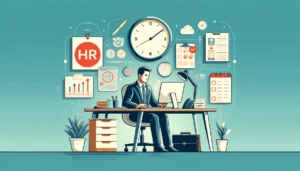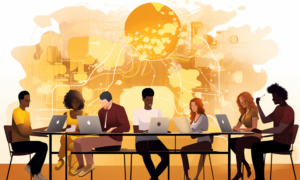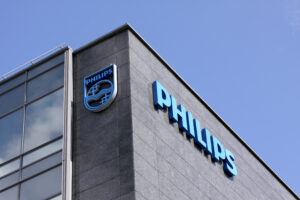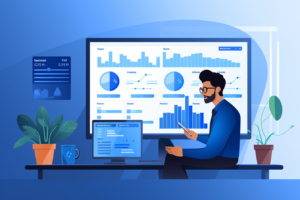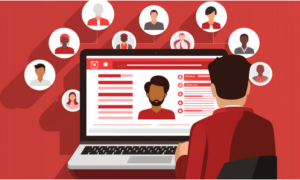Enhancing work with HR Technology: an interview with Kronos
- 5 Min Read
At KronosLIVE, HRD Connect spoke to David Morgan, International HR Director, and Liam McNeil, Senior Director, U.K. and Ireland, both with Kronos, about the future of HR and how important HR technology can be for organisations.
- Author: Louron Pratt
- Date published: Jun 21, 2019
- Categories

HRD Connect earlier this year attended KronosLIVE, an event dedicated to delving deeper into understanding the future of work. We sat down with Liam McNeil and David Morgan to discuss the biggest challenges currently facing HR, and what role HR professionals will play in the future of work.
What is the most exciting aspect of the future of work that you gathered from KronosLIVE?
L.M: What’s most exciting about an event like this for our customers is seeing the workforce innovations that we’ve worked tirelessly to develop coming to life, and helping organisations to understand how they can use these tools to increase efficiencies and productivity. Through our Workforce Dimensions solution, we’re able to pump massive amounts of data through our machine learning algorithms, and then put the artificial intelligence on top of that to really give our customers the ability to be an agile workplace, which is the number one priority for organisations right now.
L.M: One of the biggest takeaways for me from the event is the number of organisations looking to workforce management tools to improve operational efficiencies. We’re looking at improving operational efficiency to increase productivity or decrease workforce costs, and this is fundamental to what we do. On a personal level, I also find it inspiring to be with a company that has a solution that really solves a problem, and this is evident from the customer feedback here. This is a great place to be because our solution is actually solving problems and not just selling products.
D.M: As an HR professional, this is the first time I’ve worked for a company that sells to HR people, so what’s exciting for me is that we get involved in discussions with the business, about the same issues that we face within the organisation. It’s also exciting for leaders to understand the world of work, which is something that I’ve spent the last 25 years passionately trying to understand myself. Organisations these days see their people as a strategic advantage and they therefore want to find ways to use that strategic advantage better.
D.M: For HR teams, things like being able to accurately predict the potential rate of change is hugely advantageous and seeing how AI, algorithms and big data are being used to do these things that were never possible before is great. To think on top of that that your company sells this stuff is very cool.
L.M: In today’s world organisations need to respond to employee’s desires and wants, but also need to be careful not to live too far in the past and not too far in the future. This is a difficult balance for organisations to master, so another big takeaway from the event is giving managers insights into how they can achieve the right balance with the right workforce management tools to help empower and engage their most valuable asset – their employees.
What are the main challenges that you have to overcome to adapt to these now? Or future changes?
D.M: The biggest challenge for organisations is attracting and retaining talent. How they define that talent needs to look very different to what it looked like three or four years ago, and staying on top of what this looks like is an incredibly hard task in itself.
D.M: Essential to this is the style of leadership, which is seen through the CEO or senior leaders. It needs to be completely the opposite of tech savvy – it needs to be emotionally intelligent. In addition, the difference of people’s feelings and emotions in the workplace is abundant: You have multi generation workforce’s, you have the impact of technology, so you need to accommodate each individual’s needs.
L.M: CEO’s are now having to drive rapids amounts of change and be able to move capital and move their assets very quickly. This comes back to the old adage of knowing who your people are. A big challenge for organisations is understanding how to do this, and to do so efficiently. Especially when you’ve got added pressures of the economy, this cannot be ignored.
L.M: Our CEO quite often talks about the fact that attracting and retaining the best people causes you problems because the best people have options, the best people can step up and leave and at any stage, so it does take a different type of leadership, and a different type of culture.
How can HR technology aid these challenges for HR professionals?
D.M: HR teams have used technology for years in different forms, but we now have huge new capabilities because of data, machines, algorithms, etc. There’s therefore a new role in HR, which is what I would call the people economist. This is the ability to take data from lots of different aspects of the environment; the marketplace, inside the organisation, and add insight to this data to add value and help predict, rather than react.
L.M: We recently assessed a couple of hospitals that are having trouble attracting and retaining nurses. Through data insights, we were able to run some analytics over their shift patterns to offer a more flexible working pattern, making them more attractive to female nurses who have children. Implementing that system became an attraction and additionally helped diversity & inclusion.
This years KronosLIVE event was based around the future of work, new information, new developments and gaining a fresh perspective on your current workforce management solution.


